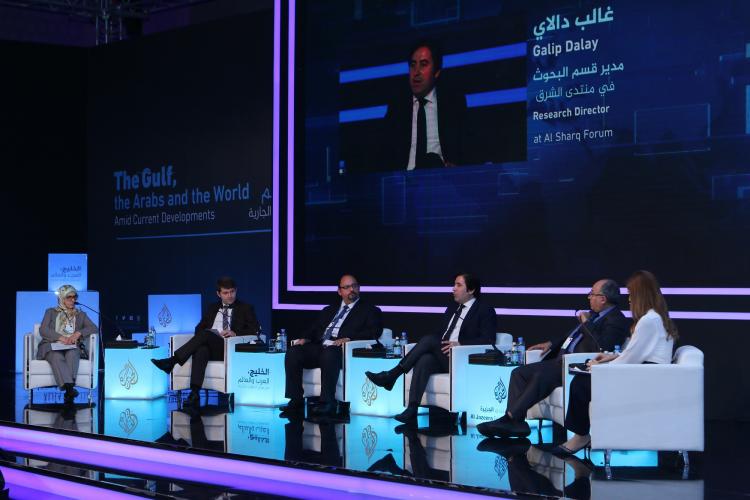Experts and researchers underlined that the current Gulf crisis is increasing the vulnerability of the Arab world, adding that the Gulf Cooperation Council (GCC) is critically afflicted with disagreement and disorder. They referred to what they described as a painful state of affairs in which non-Arab regional and international powers, such as Russia, Iran and Turkey, are the decision-makers and owners of the fate of Arab states such as Syria.
This session marked the beginning of the second day of the 12th Al Jazeera Forum, which was 29 April 2018, and featured the participation of prominent politicians, experts, intellectuals and media professionals from all over the world.
Abdullah Al Shayji, Chairman of the Department of Political Science at Kuwait University, delivered the first presentation of the forum’s fourth session, “The Middle East amid changing regional and global alliances”. “We live in a Middle East characterised by an abundance of conflict and uncertainty. We, the Arabs, do not have any role, project or vision,” he declared, referring to the spread of Iranian influence in the region during the era of former US President Barack Obama.
Galip Dalay, Research Director at Al Sharq Forum and Senior Associate Fellow at Al Jazeera Centre for Studies, said that the Middle East is now far from being sustainable, adding that its gains are subject to change at any time. He also said that while the main rhetoric previously revolved around strengthening regional security, it is now confined to strengthening the national security of individual states.
On the other hand, Leonid Issaev, Senior Lecturer at the Department of Political Science at the National Research University Higher School of Economics, said that efforts are being made to rearrange the rules of the game in the region following the collapse of the regional system due to the Arab Spring. "There is a lack of interest on the part of the big powers to resolve the Middle East’s issues,” he said. “I do not know whether anyone has a solution to the Middle East’s problems, and I believe the international powers are the ones who benefit the most from this chaos”.
Mohamad Hosam Hafez, Assistant Professor at the College of Law at Qatar University, underlined that "the Middle East we are waiting for is now composed of fragile states that often suffer and change alliances according to temporary interests.” Hafez said that he highly counts on the peoples, noting that although the influence of the peoples has receded, the dictatorships have gained ground and the Syrian revolution has not succeeded so far, there is no turning back and the peoples are now the most influential political actors.
In her presentation, Elahe Kolaie, Professor of Political Science and the Director of the Central Eurasia Research Department Centre at the University of Tehran, said, "Our region lacks development and progress,” noting that it is the largest purchaser of arms and military equipment in the past decades, according to international data. She added that there are threats facing the region and its security due to the absence of dialogue and direct interaction between the countries of the region, as well as the interference of foreign agendas in the name of democratic transformation. “We have all seen the consequences of this through the so-called Arab Spring and the disastrous situation in Syria," she said.


